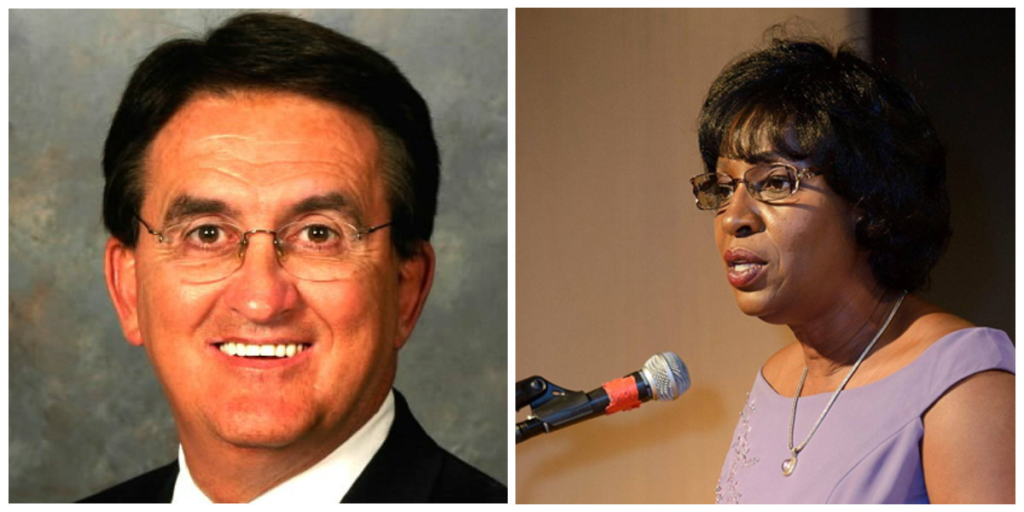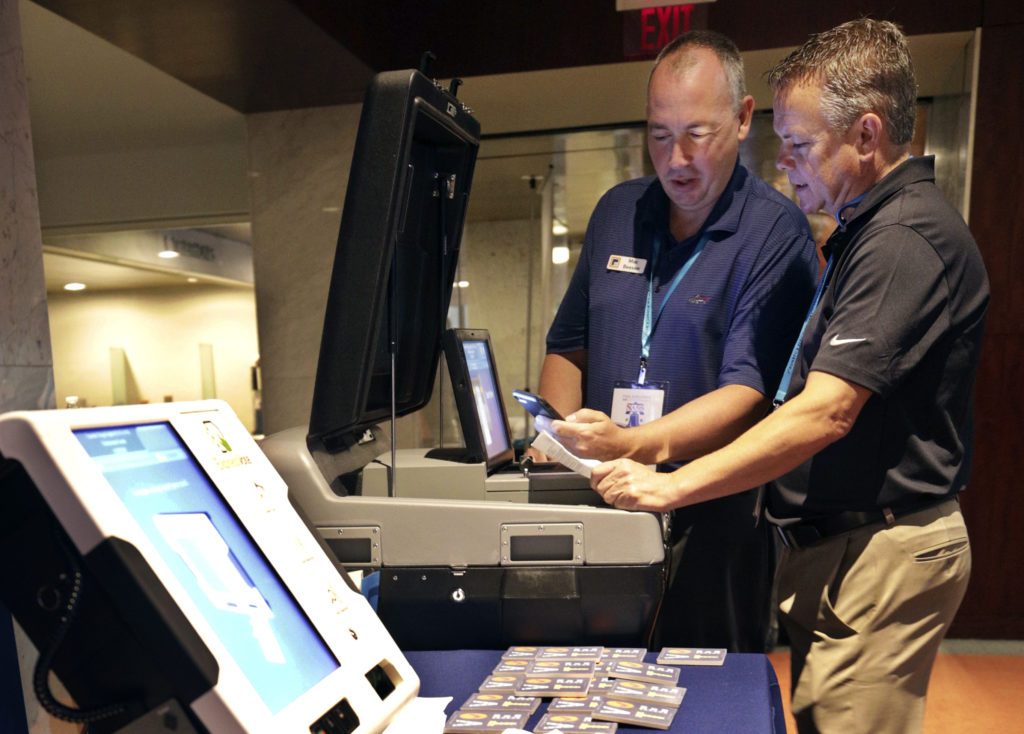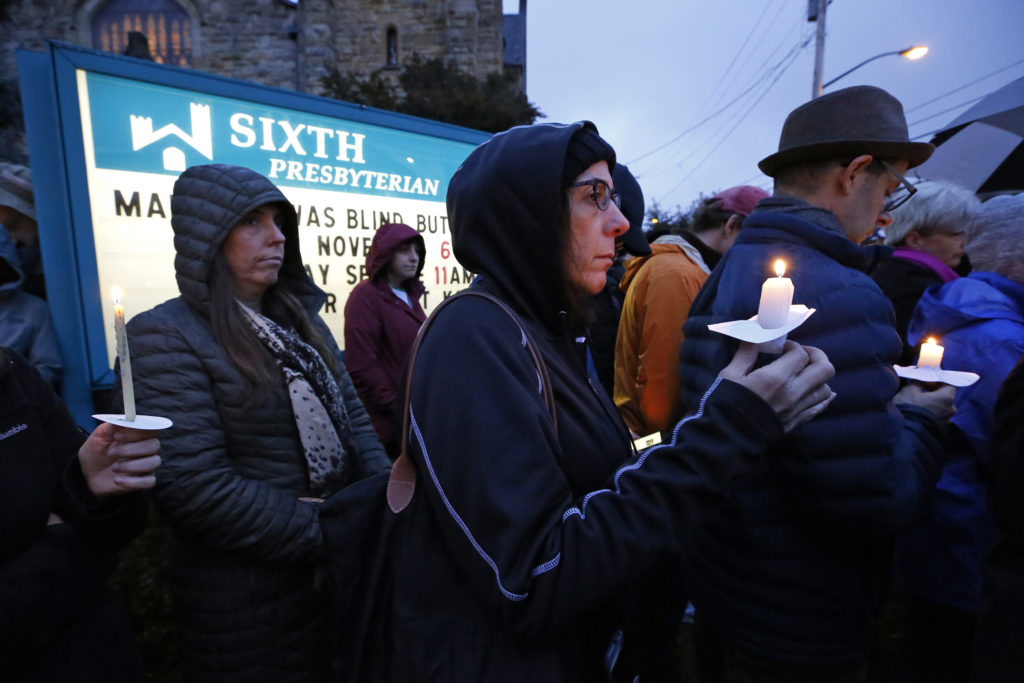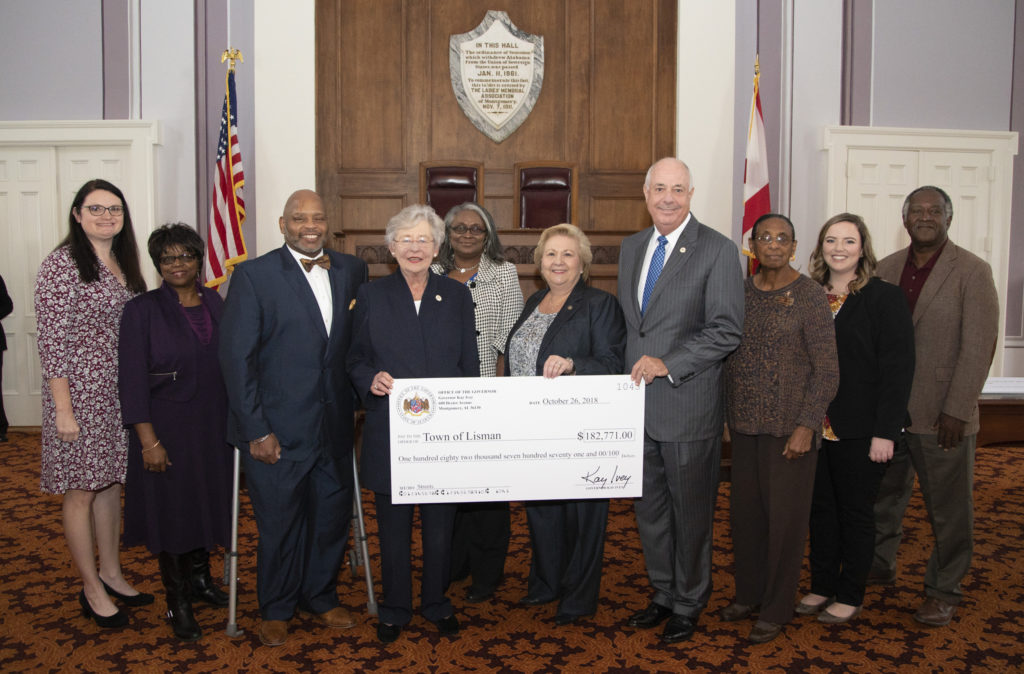Disqualified candidate, party changes the latest in JeffCo judicial races

Judicial races are often pretty straight-forward, but they’ve been anything but that in Jefferson County as of late with a last minute disqualification and a candidate making a party switch. A disqualified candidate Last week, Fayette County Circuit Judge Samuel Junkin ruled Democratic candidate Linda Hall was ineligible to run in the Nov. 6 election for Circuit Court because she failed to meet the statutory residency requirements — having not lived in the county 12 months before the election. During her trial, Hall testified she does not live in Jefferson County. “I would not have ran if I knew that I lived in Shelby County,” she said. Despite being the party’s nominee, votes for Hall will essentially be null and void, as she is no longer eligible to win the seat. Secretary of State John Merrill explained should Hall earn more votes than her Republican opponent, incumbent Theresa Pulliam, the race will be void and Gov. Kay Ivey will then appoint someone to the seat for the two-year term. Party switch Jefferson County District Judge John Amari is also keeping things interesting in Jefferson County. On Friday, the Democratic judge sent a letter to the Chairman of the Jefferson County Republican Party asking him for permission to rejoin the Republican Party. In the letter, Amari stated, “I believe qualifications and experience matter in our judges. I feel so strongly about the qualifications, experience and character of Teresa Pulliam that I feel compelled to publicly endorse, actively campaign and vote for the Republican nominee.” Elected as a Democrat in 2008, Judge Amari decided to make the switch in order to publicly work for the election of Pulliam. JeffCo GOP Chairman Sallie Bryant welcomed Judge Amari back to the party. “Judge Amari is a man of high character who has ably served the people of our county with honor and dignity. We are pleased he will use his influence to help elect our local judicial candidates,“ Bryant said.
US election integrity depends on security-challenged firms

It was the kind of security lapse that gives election officials nightmares. In 2017, a private contractor left data on Chicago’s 1.8 million registered voters — including addresses, birth dates and partial Social Security numbers — publicly exposed for months on an Amazon cloud server. Later, at a tense hearing, Chicago’s Board of Elections dressed down the top three executives of Election Systems & Software, the nation’s dominant supplier of election equipment and services. The three shifted uneasily on folding chairs as board members grilled them about what went wrong. ES&S CEO Tom Burt apologized and repeatedly stressed that there was no evidence hackers downloaded the data. The Chicago lapse provided a rare moment of public accountability for the closely held businesses that have come to serve as front-line guardians of U.S. election security. A trio of companies — ES&S of Omaha, Nebraska; Dominion Voting Systems of Denver and Hart InterCivic of Austin, Texas — sell and service more than 90 percent of the machinery on which votes are cast and results tabulated. Experts say they have long skimped on security in favor of convenience, making it more difficult to detect intrusions such as occurred in Russia’s 2016 election meddling. The businesses also face no significant federal oversight and operate under a shroud of financial and operational secrecy despite their pivotal role underpinning American democracy. In much of the nation, especially where tech expertise and budgets are thin, the companies effectively run elections either directly or through subcontractors. “They cobble things together as well as they can,” University of Connecticut election-technology expert Alexander Schwartzman said of the industry leaders. Building truly secure systems would likely make them unprofitable, he said. The costs of inadequate security can be high. Left unmentioned at the Chicago hearing: The exposed data cache included roughly a dozen encrypted passwords for ES&S employee accounts . In a worst-case scenario, a sophisticated attacker could have used them to infiltrate company systems, said Chris Vickery of the security firm Upgard, which discovered the data lapse. “This is the type of stuff that leads to a complete compromise,” he said. ES&S said the passwords were only used to access the company’s Amazon cloud account and that “there was no unauthorized access to any data or systems at any time.” All three of the top vendors declined to discuss their finances and insist that security concerns are overblown. ES&S, for instance, said in an email that “any assertions about resistance to input on security are simply untrue” and argued that for decades the company has “been successful in protecting the voting process.” STONEWALLING ON SECURITY Many voting systems in use today across the more than 10,000 U.S. election jurisdictions are prone to security problems. Academic computer scientists began hacking them with ease more than a decade ago, and not much has changed. Hackers could theoretically wreak havoc at multiple stages of the election process. They could alter or erase lists of registered voters to sow confusion, secretly introduce software to flip votes, scramble tabulation systems or knock results-reporting sites offline. There’s no evidence any of this has happened, at least not yet. The vendors say there’s no indication hackers have penetrated any of their systems. But authorities acknowledge that some election mischief or malware booby traps may have gone unnoticed. On July 13, U.S. special counsel Robert Mueller indicted 12 Russian military intelligence operatives for, among other things, infiltrating state and local election systems. Senior U.S. intelligence officials say the Kremlin is well-positioned to rattle confidence in the integrity of elections during this year’s midterms, should it choose to. Election vendors have long resisted open-ended vulnerability testing by independent, ethical hackers — a process that aims to identify weaknesses an adversary could exploit. Such testing is now standard for the Pentagon and major banks. While the top vendors claim to have stepped up their cybersecurity game, experts are skeptical. “The industry continues to stonewall the problem,” said Bruce McConnell, a Department of Homeland cybersecurity czar during the Obama administration. Election-vendor executives routinely issue assurances, he said, but don’t encourage outsiders to inspect their code or offer “bug bounties” to researchers to seek out flaws in their software. Sen. Ron Wyden, an Oregon Democrat, has long criticized what he calls the industry’s “severe underinvestment in cybersecurity.” At a July hearing, he accused the companies of “ducking, bobbing and weaving” on a series of basic security questions he’d asked them. ES&S told The Associated Press that it allows independent, open-ended testing of its corporate systems as well as its products. But the company would not name the testers and declined to provide documentation of the testing or its results. Dominion’s vice president of government affairs, Kay Stimson, said her company has also had independent third parties probe its systems but would not name them or share details. Hart InterCivic, the No. 3 vendor, said it has done the same using the Canadian cybersecurity firm Bulletproof, but would not discuss the results. ES&S hired its first chief information security officer in April. None of the big three vendors would say how many cybersecurity experts they employ. Stimson said that “employee confidentiality and security protections outweigh any potential disclosure.” SLOPPY SOFTWARE AND VULNERABILITY Experts say they might take the industry’s security assurances more seriously if not for the abundant evidence of sloppy software development, a major source of vulnerabilities. During this year’s primary elections, ES&S technology stumbled on several fronts. In Los Angeles County, more than 118,000 names were left off printed voter rolls. A subsequent outside audit blamed sloppy system integration by an ES&S subsidiary during a database merge. No such audit was done in Kansas’ most populous county after a different sort of error in newly installed ES&S systems delayed the vote count by 13 hours as data uploading from thumb drives crawled. University of Iowa computer scientist Douglas Jones said both incidents reveal mediocre programming and insufficient pre-election testing. And voting equipment vendors have never seemed security conscious “in any
Birmingham Jewish community reacts after deadly Pittsburgh synagogue attack

The Levite Jewish Community Center (JCC) of Birmingham is speaking out after several people were shot and killed at a synagogue in Pittsburgh on Saturday morning. “The Birmingham Jewish Community is shocked and saddened by the hatred and the senseless loss of life experienced by members of the Tree of Life Synagogue in Pittsburgh on Saturday, our Shabbat,” wrote the Levite JCC on Facebook. “We grieve for those lost and pray for healing for their loved ones and their whole community. We are touched by and grateful for the outpouring of support and love from the greater Birmingham faith community.” On Saturday, the gunman opened fire at the Tree of Life synagogue, killing 11 people and injuring six others, among them four police officers. It was the deadliest attack ever on Jews in the United States. According to law enforcement, suspect Robert Bowers specifically targeted Jews on social media posts online and made anti-Semitic comments during the shooting. The Levite JCC is organizing a prayer vigil for the community, Tuesday, October 30 at 6:30pm on the steps of Temple Beth-El Synagogue, 2179 Highland Ave. Called “Stand with Pittsburgh: A Prayer Gathering for Shalom (Peace),” the event will “offer prayers for Shalom, Peace, for our brothers and sisters in Pittsburgh and for our country.” Read the full Facebook post below:
Jim Zeigler launches ad focused on Montgomery corruption

With just eight days to go until the Nov. 6 general election, Alabama State Auditor Jim Zeigler launched a $10,000 broadcast campaign ad buy Monday to urge voters to support him in next week’s midterm elections. The 30-second spot titled, “Why are Montgomery politicians fighting against Jim Zeigler?” highlights Zeigler’s actions challenging what he calls “waste, mismanagement and corruption” in Montgomery. Zeigler says he has “a limited campaign budget and must use every way to get more bang for the buck.” His ad is running only in the Birmingham market. “We figured out ways to make our slender $10,000 ad campaign have the impact of $300,000,” Zeigler explained. Zeigler will face Democratic challenger Miranda Joseph next Tuesday. Joseph, who has been the Democratic nominee for State Auditor the past three general elections, automatically advanced to the general election, as she faced no primary opponent. Zeigler previously defeated Joseph in 2015. He has held the position ever since. Watch the spot below: Text of the Zeigler ad: Why are Montgomery politicians fighting against Jim Zeigler? Because Zeigler is a State Auditor who fights corruption and wasteful spending. Zeigler stands for us, the taxpayers. Not for Montgomery politicians. Jim Zeigler filed the initial ethics complaint against Robert Bentley and challenged no-bid contracts. Zeigler has a consistent record of fighting misuse of taxpayer money. Vote Jim Zeigler, a State Auditor for us.
Bradley Byrne: Our farmers are our future

This past week, I had the pleasure of visiting many fine farmers and foresters throughout Southwest Alabama to learn more about the incredible work they do on a daily basis. This was part of my annual “Ag Matters” agricultural tour, which brings me to farms and forests in each of the six counties that make up Alabama’s First Congressional District. Forestry in Alabama first began in Clarke County, and that is where I began my tour. I was pleased to learn more about how the people at Canfor Southern Pine carry on the forestry tradition to this day. Not only are they the largest employer in Jackson, Canfor produces high-quality lumber products that are used all throughout the Eastern United States. At this mill alone, they produce around 110 million board feet per year in lumber products. To produce this much material, they rely on the sustainable harvesting of private timberlands throughout our region. I had a chance to tour some of these private timberlands and learn more about ways owners are working with the Fish and Wildlife Service to protect endangered and threatened species. It is important that we find solutions that work for both our environment and for those trying to make a living through sustainable practices. Animals such as the gopher tortoise and the black pine snake are threatened in certain areas of Alabama. Timberland owners and workers want to protect our environment, as a healthy environment is critical to their future. But, they should not be unduly limited by the government in the work they do. I was able to talk with several foresters from all around Southwest Alabama at a forestry roundtable hosted at a local branch of Alabama Ag Credit. The people at Ag Credit also know that our farmers and foresters are our future and believe in providing them with sound financial options through responsible lending and thorough financial counseling. As I continued my tour, I saw some excellent examples of topiary management at a garden nursery in Mobile, learned about the bumper crop of cotton this year at farms in Escambia and Baldwin counties, and was informed of the status of this year’s peanut harvest. This past year, I was one of the leading advocates to get cotton back in Title I of the Disaster Package to provide further assistance and recovery options for farmers adversely affected by unforeseen natural circumstances. One of the biggest takeaways from my tour this year was just how fortunate we are that we were not more directly impacted by Hurricane Michael. I’m dedicated to working with Representative Martha Roby on continued recovery efforts for farmers in the Wiregrass and throughout South Alabama. We need to make sure they receive the necessary federal and state assistance they deserve to get through these unexpected and difficult times. One thing is certain: as we enter the final legislative session of this year, we must reauthorize the Farm Bill. The Farm Bill will provide greater protections for the cotton and peanut growers in our area and for other farmers and foresters throughout Alabama and the nation. Without the tireless efforts of producers all across the nation, life as we know it would not exist. From providing the food we eat, to the raw materials for the clothes we wear, to the foundational building elements all around us, our farmers and foresters impact our daily lives in truly tangible ways. We owe it to them to fight for more protections to help create a stronger future for all of Alabama, and we must always remember that our farmers are our future. ••• Bradley Byrne is a member of U.S. Congress representing Alabama’s 1st Congressional District.
Community Development Block Grants awarded to help improve 54 communities statewide

54 Alabama towns, cities and counties were awarded a total of nearly $17.8 million in Community Development Block Grants (CDBG) on Friday by Governor Kay Ivey. The 54 grants will support a number of community improvement projects including water and sewer extensions and rehabilitation, street and drainage improvements, housing rehabilitation and community centers. “The beginning of a better Alabama starts today for many residents who are without clean water to drink or safe roads to drive or suitable housing in which to live,” Ivey said. “I am pleased to award these grants to support vital community improvement projects, and I commend the dedicated local officials who sought these grants with the intent to make their communities better places to live.” CDBG are awarded annually through a competitive process in four main categories including small city, large city, counties and community enhancements. Other categories in this round include Black Belt and planning grants. Award determinations are based on the number of low and moderate-income families affected, urgency of the need and project cost efficiency. The Alabama Department of Economic and Community Affairs is administering the grants from funds made available by the U.S. Department of Housing and Urban Development (HUD). “As a former mayor whose city has been a recipient of CDBG awards, I can attest to how important this program is to our towns, cities and counties and the difference these grants can make in a community,” explained ADECA Director Kenneth Boswell. “ADECA is pleased to join Governor Ivey in the partnerships that it takes to make these grants come to fruition.” Those awarded grants, grant amounts and projects are: Small City Fund (Municipalities with populations of 3,000 or less) Beatrice – $350,000 for street improvements. Camden – $350,000 for water and sewer improvements. Carrollton – $350,000 for sewer improvements. Cherokee – $314,000 for street and drainage improvements. Detroit – $350,000 for water improvements. Falkville – $350,000 for sewer improvements. Luverne – $350,000 for water and street improvements. Millry – $350,000 for water improvements. New Hope – $350,000 for sewer and street improvements. Oak Grove – $200,000 for sewer improvements. Parrish – $350,000 for street and drainage improvements. Pisgah – $314,900 for water improvements. Rutledge – $350,000 for street improvements. Samson – $350,000 for sewer, water and street improvements. Sumiton – $350,000 for sewer improvements. Toxey – $350,000 for street improvements. Woodville – $350,000 for street and drainage improvements. Vredenburgh – $350,000 for street improvements. Large City Fund (Municipalities with populations of 3,001 or more) Andalusia – $280,000 for street improvements. Demopolis – $450,000 for sewer improvements. Elba – $450,000 for downtown revitalization. Eufaula – $450,000 for housing rehabilitation. Haleyville – $450,000 for sewer, water, drainage and street improvements. Hamilton – $450,000 for sewer, water, street and drainage improvements. Jacksonville – $429,713 for sewer improvements LaFayette – $450,000 for water improvements. Piedmont – $450,000 for sewer improvements. Roanoke – $359,487 for street improvements. Talladega – $450,000 for sewer improvements. Tuskegee – $450,000 for water and street improvements, and demolition and revitalization. County Fund (applies to 65 Alabama counties with Mobile and Jefferson counties receiving CDBG funds directly from HUD) Baldwin County – $350,000 for water improvements near the Lillian community. Hale County – $350,000 for water improvements in the Akron area. Madison County – $300,000 for water improvements east of Huntsville. Marshall County – $350,000 for street improvements on several county roads. Monroe County – $350,000 for water improvements west of Frisco City. Montgomery County – $350,000 for housing rehabilitation in Eastwood Villa. Sumter County – $350,000 for water improvements north of Cuba. Washington County – $350,000 for water improvement in the Fruitdale area. Community Enhancement Fund (municipalities of all sizes and 65 Alabama counties for projects addressing quality of life issues.) Akron – $250,000 for sewer improvements. Autaugaville – $250,000 for a new senior center. Barbour County – $250,000 for a new fire station in the Texasville community. Billingsley – $250,000 for town park improvements. Blountsville – $250,000 for sewer and street improvements. Blue Springs – $185,000 for water improvements. Butler County – $250,000 for courthouse renovations/handicapped accessibility. Cottonwood – $250,000 for street improvements. Dozier – $247,510 for demolition and clearance. Enterprise – $250,000 for demolition and clearance. Lauderdale County – $202,569 for a new senior center in the Greenhill community. Lisman – $182,771 for street improvements. Midway – $250,000 to convert a school into a community center. River Falls – $250,000 for street improvements. Black Belt Fund (municipalities and counties within a 12-county Black Belt region.) Selma – $450,000 for drainage improvements. Planning Fund (awarded to guide municipalities in orderly growth, revitalization or development.) Piedmont – $40,000 Skyline – $35,000
Some Jeff Sessions allies hope White House allows graceful exit

Sensing that Jeff Sessions’ days at the Justice Department may be numbered, some of his supporters want the White House to allow for a graceful exit for an attorney general they believe has dutifully carried out the administration’s agenda even while enduring the president’s fury. It seems unlikely that efforts to soften a possible dismissal after the Nov. 6 midterm election would find sympathy in the White House, where President Donald Trump’s rage remains unabated over the attorney general’s recusal from the Russia investigation. A hand-picked successor could theoretically oversee the rest of the probe in place of Deputy Attorney General Rod Rosenstein. But some supporters say they hope that if and when Sessions is replaced, his record as senator and attorney general will be recognized and not overwhelmed by Trump’s attacks, or that the administration will at least respect the Justice Department by guaranteeing a smooth transition. A scenario advocated by at least one Sessions ally, former Cincinnati Mayor Ken Blackwell, would allow him to remain on the job until January and be permitted to resign on his own then rather than be fired immediately after the midterms. Blackwell said allies have made their case to administration officials that Sessions has successfully pushed the president’s core priorities, including on illegal immigration, and deserves some sort of recognition from the White House that “he has more than a passing grade.” “It is not unknown, from anyone from John Kelly to Jared Kushner, that there is a base of support,” said Blackwell, referring to Trump’s chief of staff and son-in-law. “A portion of that base is ready to continue advocacy for his service.” Newt Gingrich, a former Republican House speaker who is close to the White House and calls himself a longtime “admirer” of Sessions, said he would be open to serving as an intermediary if asked between the White House and Sessions supporters. “He deserves a graceful exit. His career deserves a strong conclusion,” said Gingrich, who called Sessions “a strong conservative who has done strong work at the Department of Justice.” Sessions, who has publicly acknowledged the president’s displeasure, has plowed forward with the conventional duties of the job, including a regular calendar of events and announcements. On Friday, he spoke first at the Justice Department news conference announcing the arrest of a mail-bomb suspect in Florida. The president, though mindful that Sessions remains popular among much of his base, would seem unlikely to sign off on a plan to extend Sessions’ time in office, according to a White House official and an outside adviser familiar with Trump’s thinking but not authorized to publicly discuss private conversations. Trump has repeatedly had to be talked out of firing Sessions before November and has signaled to allies that he wants to make sweeping changes at the Justice Department once the midterms have concluded. He told The Associated Press this month that he was “not thrilled” with Sessions but made no commitment to dismiss him. If Trump were to wait, it would not be out of deference to Sessions, but rather because the White House would be managing the fallout from the midterms and preparing for a pair of presidential overseas trips in November, according to the official. Sessions’ decision to recuse remains his original sin in Trump’s eyes. Trump has fumed that Sessions has not done more to protect his personal interests and has vented about what he sees as Sessions’ failure to get a handle on immigration and his lack of emphasis on combating transnational criminal organizations. Cameron Smith, a former Sessions Senate aide, said, “The idea that this gets better — they stand next to each other and sing common praises — I just don’t see anybody looking at that seriously.” After being berated by Trump over the recusal decision last year, Sessions offered his resignation, but it was rejected. He has been widely viewed as determined to stay in the job because he believes in Trump’s agenda, which largely mirrors his own interests, and reluctant to leave a job for which he gave up a Senate seat. For more than a year, Trump has repeatedly polled advisers as to whether he should fire Sessions. Some of his closest aides, including attorney Rudy Giuliani, have counseled him not to do so, at least not yet. The case that Sessions’ protectors outlined to Trump largely consists of three components: Firing Sessions, a witness in special counsel Robert Mueller’s investigation of obstruction of justice, would add legal peril to his standing in the Russia probe. Doing so would anger the president’s political base, which Trump cares deeply about, especially before the midterms. A number of Republican senators would rebel against the treatment of a longtime colleague and potentially not hold confirmation hearings for a replacement if the GOP holds onto the Senate. Blackwell, the Sessions friend, said conservatives are divided between those who support firing him immediately and those who regard him as loyal to their cause, protective of their ideals and propelling Trump’s agenda. Gingrich, for instance, calls the recusal “inexcusable” even as he professes admiration for Sessions. The ground appears to have softened recently after some influential Republicans, including Sen. Lindsey Graham, suggested Trump would have the right, after the elections, to select a replacement he trusted. Smith said one way Trump could enable a respectful exit would be for the White House to craft a smooth succession plan and allow Sessions to be part of the process. Ed Meese, a Reagan administration attorney general and Sessions friend, said he wasn’t thinking about Sessions’ departure because “I don’t want to see him fired at all.” “I think he’s taken it with grace,” Meese said of Sessions’ response to Trump’s anger. “What he is recused from is less than 1 percent of the department and he has done an outstanding job in everything he’s done in the department.” Republished with permission from the Associated Press.
Analysis: Politics presses on amid election-season tragedy

President Donald Trump‘s campaign rallies continued. Attack ads stayed on the airwaves. Political combat largely carried on. Amid a wave of election-season violence that left many Americans on edge, the contentious midterm campaign has barreled forward with little pause. Trump and other politicians disavowed the pipe bombs sent to prominent Democrats and condemned the massacre of 11 people at a Pittsburgh synagogue this past week. But the divisiveness that has dominated the nation’s politics kept creeping back. During a rally Saturday night, Trump asked a crowd of red-hatted supporters if it was OK for him to “tone it down, just a little bit.” When the crowd roared back with a decisive “No!” Trump replied: “I had a feeling you might say that.” The attacks are a grim capstone to a midterm campaign that will serve as a referendum on Trump, whose unorthodox approach to the presidency is particularly glaring in times of tragedy. With less than two weeks to go before Election Day, Trump was among many politicians who largely stuck to the script, raising questions about whether Americans are becoming increasingly desensitized in the wake of tragedy. “It feels in this moment like there’s a numbness,” said Jennifer Psaki, who served as a campaign and White House adviser to former President Barack Obama. “When there’s a tragedy, the nation is a little rudderless.” Some Trump supporters have begun to suggest that the president modulate his searing and personal attacks on his opponents — including those targeted by the Trump supporter who allegedly mailed pipe bombs to several Democrats. “In general, we got to tone it down,” said Anthony Scaramucci, who briefly served as Trump’s White House communications director, in an interview on CNN’s “State of the Union.” ”He’s the president of the United States. He controls the news cycle and the bully pulpit. And he could do it.” To be sure, Trump has struck some conciliatory notes in recent days, including vowing to do “everything in my power as president” to stop political violence. He condemned the synagogue shooting as an “evil anti-Semitic attack” and called it “an assault on all of us.” But with just over a week before elections that will determine the control of Congress, Trump has also expressed frustration that outside events are distracting from what he sees as rising GOP momentum. In a tweet last week, he put the word “bomb” in quotation marks and said the media was “not talking politics.” Trump took to Twitter Sunday night to again argue that the media was unfairly blaming him for the divisions in the country. He added that “it is their Fake & Dishonest reporting which is causing problems far greater than they understand!” He also said he would “probably pass” on reaching out to pipe-bomb targets Hillary Clinton or Obama — overtures that would almost certainly have garnered bipartisan praise. He’s also kept up some of his attacks on others targeted with pipe bombs. On Sunday he called Democratic megadonor Tom Steyer a “crazed & stumbling lunatic” and warned that backing Democratic candidates would be a vote for California Rep. Maxine Waters, who he has previously said has a low IQ. The president also did nothing on Saturday to stop his supporters from chanting “lock her up” — a frequent rally refrain about Clinton, his opponent in the 2016 presidential election. After a riff about another of his favorite foes — Massachusetts Democratic Sen. Elizabeth Warren, who was not targeted in the pipe bomb plot — Trump seemed to acknowledge that there were limits to his ability to ratchet down his rhetoric. “We can’t resist,” he said. Asked about Trump’s decision to keep campaigning amid tragedy, White House spokeswoman Sarah Huckabee Sanders said Trump was “committed to the safety and security of all Americans, and he mourns with the nation in the aftermath of the evil anti-Semitic attack in Pittsburgh.” She added that Trump was committed “to supporting leaders who will fight alongside him to protect the safety and security of all Americans, grow our booming economy and move our country forward.” Of course, Democrats have been just as blistering in their condemnation of Trump during the midterm campaign. Some have declared him unfit for office and a danger to democracy. Many were also quick to blame him for creating the atmosphere that led to this week’s violence. “There’s no escaping the tone that he sets,” U.S. Rep. Adam Schiff, a California Democrat and frequent Trump critic, said Sunday on CNN. “It’s going to fall on the rest of us to make this a more perfect union to bring people together, to accentuate our common humanity.” It was mainly in Pennsylvania where the impact of the violence on the campaign was really noticeable. After Saturday’s shooting, there were a few moves to tamp down campaigning. Democrats Sen. Bob Casey and Gov. Tom Wolf and Wolf’s Republican opponent, Scott Wagner, all announced on Sunday that they were canceling campaign events. Wolf also took campaign ads off the air. But across the country, millions of dollars in negative political advertisements still filled the airwaves, including some referencing billionaire George Soros, a liberal donor who received the first pipe bomb last week. Rep. Steve Stivers, chairman of the National Republican Congressional Committee, defended one such ad, saying “you know, that ad is factual.” Violence has intruded in political campaigns before. When a gunman killed 12 people in a movie theater in Aurora, Colorado, during the height of the 2012 presidential campaign, both Obama and Republican nominee Mitt Romney paused some campaign activities. “There are going to be other days for politics,” Obama said at the time. Trump’s explanation for going forward with his political events was far different. “We have our schedules, and nobody’s going to change it,” he said. “So we’re here.” Republished with permission from the Associated Press.
Martha Roby: A report from the road – talking business and Hurricane Michael

With Congress out of session for an October district work period, I have taken this valuable time to be on the road in Alabama’s Second District visiting with the people I represent and sharing with them an update from Washington. I believe this time we spend together is truly invaluable. It’s so important for me to hear from local leaders, business owners, and employees about how the issues of the day impact them in their daily lives so that I can better represent their views in Congress. During this district work period, I spent time in Columbia, Headland, Dothan, Gordon, Luverne, Goshen, Opp, and Troy. Since parts of our district were ravaged by Hurricane Michael this month, I have been especially grateful for this time away from Washington to visit impacted communities to assess the damage and talk with our farmers on the ground. In Columbia, I met with Mayor Rhonda Freeman, and she updated me on the damage her town is facing. In Headland, I had lunch with a group of Henry County farmers, and we discussed agriculture recovery efforts. The farmers in our district are truly facing unprecedented losses, and I will remain engaged as we push through this rebuilding process together. In Dothan, I sat down with Chris Judah, Director of the Houston County Emergency Management Agency. In Gordon, I toured several farms to assess the Hurricane Michael damage. In Luverne, I had the opportunity to address the Crenshaw County Chamber of Commerce during a lunch meeting. We had a conversation about the numerous successes our unified government has had over the last two years. As I told the group, the American people are much better off now than we were before. While in town, I also stopped by Hicks, Inc. They’re the number one national wholesale distributor of fishing, hunting, marine, archery, and other outdoor products. I was very impressed by their extensive operations and impressive facility. In Goshen, I visited the high school to check out their career tech facility. I was blown away by the numerous outstanding opportunities that are available to students right here in our district. Did you know that most Goshen High School students graduate having already obtained an Associate degree? It’s true. The students I met while on campus were truly remarkable young men and women. In Opp, I participated in a roundtable discussion with local business leaders. We had a very productive conversation about ways we can work to bring new opportunities to Opp and the surrounding communities. While I was there, I also had the opportunity to meet former Alabama football Head Coach Mike DuBose and his wife Polly. In Troy, I met with Troy University officials, and they briefed me on a $3.2 million grant the university recently received from the National Institute of Standards and Technology. This is the largest grant Troy University has received in the school’s history, and it will establish the Center for Materials and Manufacturing Sciences at the university. This research will focus on polymers and plastics recycling, and it will go a long way towards preparing the next generation of the workforce in this industry. We are so fortunate to have Troy University in Alabama’s Second District, and I’m always proud to learn more about the ways the school is growing and thriving. It has been a productive month so far, and I really appreciate the many individuals who took time out of their busy lives to talk with me. I am looking forward to many more opportunities to hear directly from the people I represent. My priority is always to be the very best representative of our shared beliefs that I possibly can. ••• Martha Roby represents Alabama’s Second Congressional District. She lives in Montgomery, Alabama, with her husband Riley and their two children.


